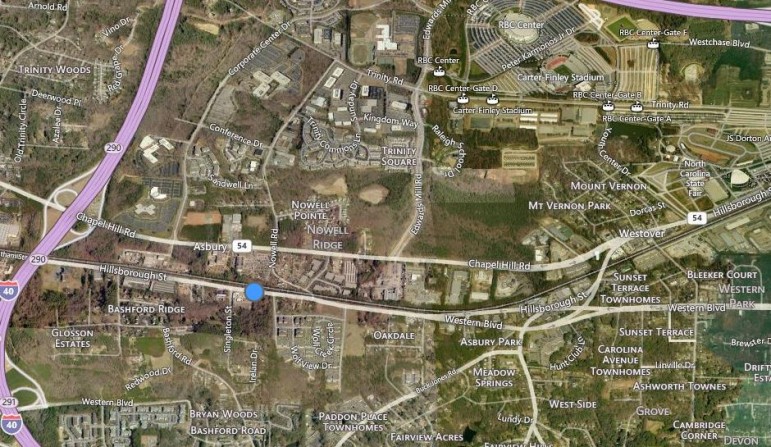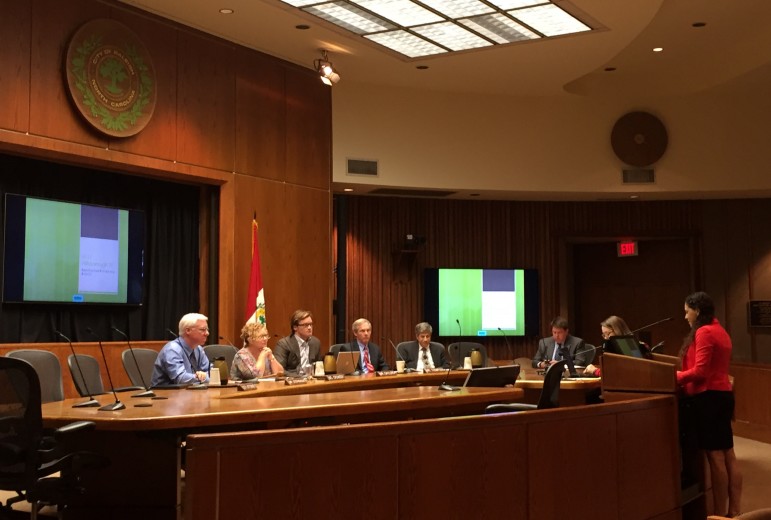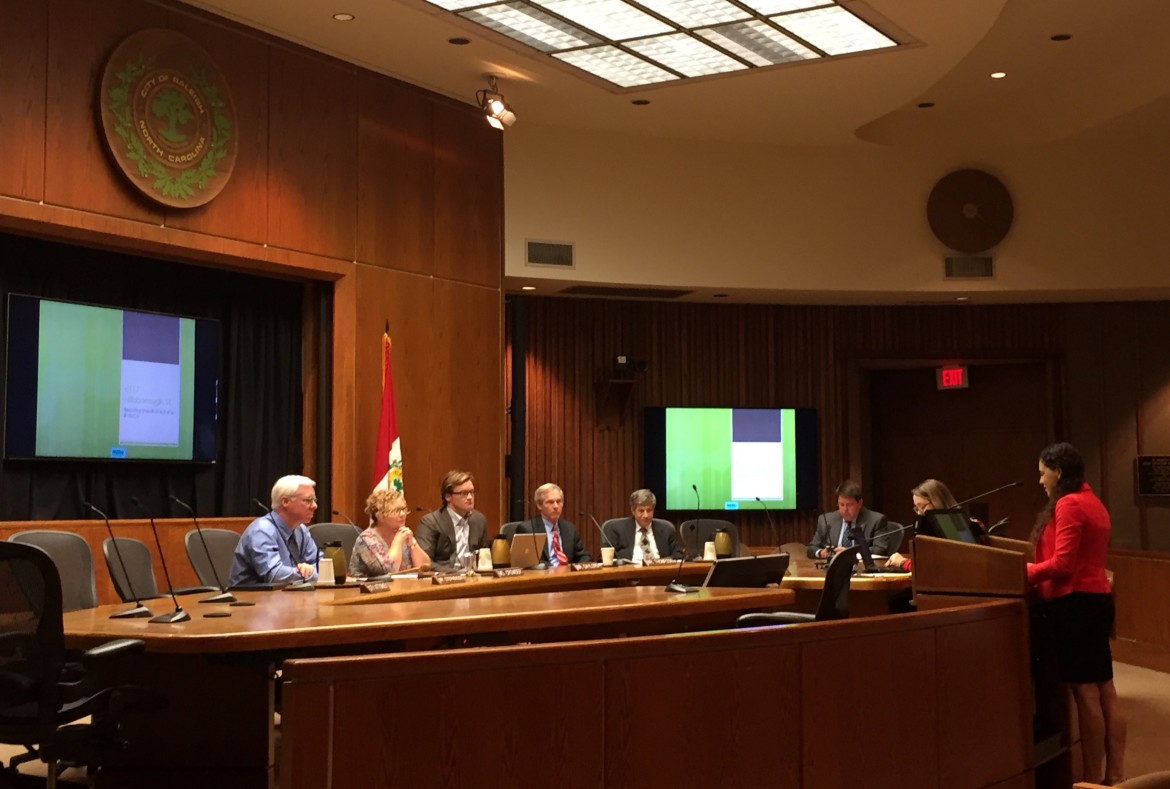A rezoning case that Planning Commission Chairman Steven Schuster once described as an “old friend” was delayed yet again this week following a lengthy meeting of the Growth & Natural Resources Committee on Wednesday.
First filed in 2013, case Z-34-13 would rezone a parcel of land at 6117 Hillsborough Street that is currently split between R-4 and R-10 classifications so that the entire property would be zoned R-10.

Bing Maps
The site in question is indicated by the blue dot
This would allow the Toma family, who has owned the property since 1982, to build a higher-density town home development on the site than allowed under present conditions. The current zoning caps out at 44 units; the change would allow for 66.
The Record initially reported on this case back in May 2015, when the developers requested a deferral to allow more time to address neighborhood concerns. A month earlier, several neighbors filed a valid statutory protest petition against the project. At the time, most of these concerns were stormwater related, a theme that continued at Wednesday’s committee meeting.
“It’s hard to truly determine what kind of an impact a major storm could have on a development like this,” said Councilor Kay Crowder, chairwoman of the committee.
“One of the things we have to deal with as a City is that there’s problems coming in front of us related to stormwater from all across Raleigh,” Crowder said.
The Toma family had previously added a condition to the project that would have them install 25-year stormwater controls, instead of the two and ten year controls as required by code.
Blair Hinkle, a stormwater program manager with the City, said the condition was “certainly more protective from a stormwater standpoint” than what would otherwise be required.
While the four Councilors who sit on the Growth and Natural Resources Committee, Kay Crowder, Bonner Gaylord, Russ Stephenson and Dickie Thompson voiced various concerns related to Z-34, City planner Doug Hill noted that Planning Commissioners had considered the case “a very reasonable request.”
In its report to the Planning Commission last May, staff had reported they found the rezoning to be consistent with the Comprehensive Plan, Future Land Use Map, and Urban Form Map, and noted the rezoning would call for increased residential density, something the city, with its limited housing stock, is is need of.
Stephenson said he was worried the additional stormwater runoff generated by the property could negatively impact the septic tanks and wells of the property’s surrounding neighbors, who are not connected to the City’s water supply because their land is considered extraterritorial jurisdiction.
When asked what kind of impact the development would have on said wells and septic tanks, stormwater manager Hinkle was unable to give a definitive answer.
Gaylord was concerned that without a cross-access agreement between the Toma family and one of its neighbors, likely the Vie Apartments (née the Wolf Creek Apartments), traffic flow in and out of the development would bottleneck and access by first responders would be made overly difficult. He suggested that if the only access to the property was from Hillsborough, the density should be kept at its current limit of 44 units.
Thompson did not like the idea of stacking of so much density into such a small area, and said he would be more comfortable with the project if there were more stormwater controls installed.
Crowder, who noted she was still learning about stormwater issues, said the eventual development of the surrounding sites, combined with a high-density townhome project, would make predicting the stormwater impact very difficult, and, like Thompson, wondered if there was more the Toma family could do beyond the already agreed-upon 25-year controls.
Nicole Toma, whose father and grandparents own the land, took over management of the rezoning case in early January.

James Borden
Nicole Toma addresses the Growth and Natural Resources Committee
Before Wednesday’s committee meeting, Toma told the Record that dealing with the case had been a bit overwhelming.
“I thought it would be a much simpler process!” she said.
Reading from a prepared statement at the meeting, Toma told Councilors that the family has worked hard to alleviate the neighbors’ concerns.
The stormwater measures they will install, she said, will maintain the predevelopment runoff rates post-development.
“Additionally,” Toma said, “The controls we put in place for controlling large storm events will improve drainage during the more frequent small to medium sized rain events.”
One of Toma’s neighbors, Alvaro Casella, spoke out in favor of the development on Wednesday, but it was Ira Botvinick from the City Attorney’s office whose words may have done the Toma family the most good.
Botvinick began by pointing out that it would be almost impossible for the family to get cross-access from their surrounding neighbors, as it would offer those neighbors no benefit and possibly restrict their own future development.
“Realistically speaking,” Botvinick said, “you could ask, but I think the chances are it won’t be granted.”
As far as traffic concerns go, Botvinick said, single-family homes generate more trips per day than do apartment or townhome units.
“Council can express its feelings on the case,” he said.
“But it is consistent with the Comprehensive Plan, it’s consistent with what we want to do — create density, have people use mass transit — and this is a mass transit area.
“I understand the concerns you have for the neighbors,” he added, in reference to the wells and septic tanks on surrounding properties.
“All I’ll say for that is, they’re outside city limits.”
Following Botvinick’s comments, Crowder asked Toma if they would add a condition requiring them to install a bus shelter. She also requested that the family look into the possibility of cross-access with their neighbors and the possible installation of volumetric stormwater controls.
Stephenson, rebuffed in his earlier request for an analysis of the impact on surrounding wells and septic systems, asked if Toma could have their project engineer examine the issue.
Toma agreed to look into all of these requests, saying she’d need to discuss them with her family first. Councilors then voted to defer the case.
It will be brought back to the Growth and Natural Resources Committee in two weeks, but Toma will be required to turn in a draft of the changes by Friday, April 15.
